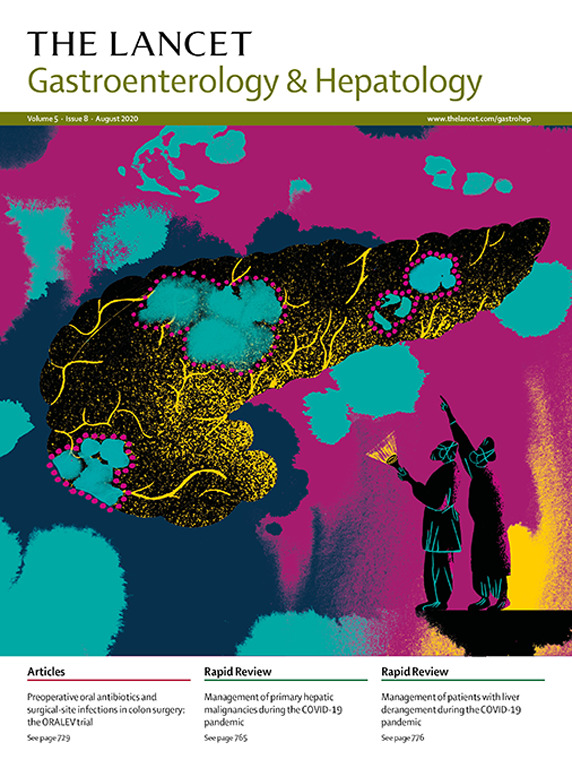Personalisation of therapy in irritable bowel syndrome: a hypothesis
IF 30.9
1区 医学
Q1 GASTROENTEROLOGY & HEPATOLOGY
引用次数: 0
Abstract
Irritable bowel syndrome (IBS) is a common disorder of gut–brain interaction characterised by symptoms of abdominal pain, occurring at least 1 day per week, and a change in stool frequency or form. Individuals with IBS are usually subtyped according to their predominant bowel habit, which is used to direct symptom-based treatment. However, this approach is probably an oversimplification of a complex and multidimensional condition, and other factors, such as psychological health, are known to influence symptom severity and prognosis. We have previously used latent class analysis, a method of mathematical modelling, to show that people with IBS can be classified into seven unique clusters based on a combination of gastrointestinal symptoms, abdominal pain, extraintestinal symptoms, and psychological comorbidity. The clusters can be used to predict the prognosis of IBS (eg, symptom severity), health-care use (eg, consultation behaviour, prescribing, and costs), and impact (eg, quality of life, work and productivity, activities of daily living, and income). These clusters could also be used to increase the personalisation of IBS treatment that better recognises the heterogenous nature of the condition. We present new data providing additional validation of our seven-cluster model and conduct a comprehensive evidence-based review of IBS management. Based on this evidence, we propose a framework of first-line and second-line treatments according to IBS cluster. Finally, we discuss what further research is needed to implement this approach in clinical practice, including the need for randomised trials comparing cluster-based treatment with conventional treatment according to stool subtype.肠易激综合征的个性化治疗:一个假设
肠易激综合征(IBS)是一种常见的肠-脑相互作用紊乱,其特征是每周至少有一天出现腹痛症状,大便次数或形态发生变化。肠易激综合征患者通常根据其主要的排便习惯进行亚型分类,并以此指导对症治疗。然而,这种方法很可能过度简化了一种复杂而多维的疾病,而且已知其他因素(如心理健康)也会影响症状的严重程度和预后。我们曾使用潜类分析(一种数学建模方法)表明,根据胃肠道症状、腹痛、肠道外症状和心理并发症的组合,肠易激综合征患者可被分为七个独特的群组。这些群组可用于预测肠易激综合征的预后(如症状严重程度)、医疗保健的使用(如就诊行为、处方和费用)和影响(如生活质量、工作和生产率、日常生活活动和收入)。这些群组还可用于提高肠易激综合征治疗的个性化程度,从而更好地认识到该疾病的异质性。我们提供的新数据进一步验证了我们的七组模型,并对肠易激综合征的治疗进行了全面的循证审查。在这些证据的基础上,我们根据肠易激综合征群组提出了一线和二线治疗框架。最后,我们讨论了在临床实践中实施这种方法所需的进一步研究,包括根据粪便亚型对基于簇的治疗和传统治疗进行比较的随机试验的必要性。
本文章由计算机程序翻译,如有差异,请以英文原文为准。
求助全文
约1分钟内获得全文
求助全文
来源期刊

Lancet Gastroenterology & Hepatology
Medicine-Hepatology
CiteScore
50.30
自引率
1.10%
发文量
0
期刊介绍:
The Lancet Gastroenterology & Hepatology is an authoritative forum for key opinion leaders across medicine, government, and health systems to influence clinical practice, explore global policy, and inform constructive, positive change worldwide.
The Lancet Gastroenterology & Hepatology publishes papers that reflect the rich variety of ongoing clinical research in these fields, especially in the areas of inflammatory bowel diseases, NAFLD and NASH, functional gastrointestinal disorders, digestive cancers, and viral hepatitis.
 求助内容:
求助内容: 应助结果提醒方式:
应助结果提醒方式:


